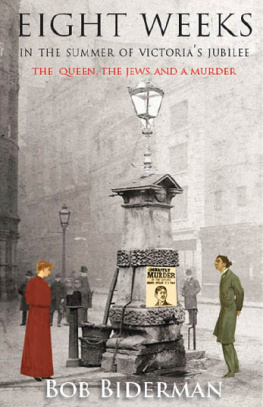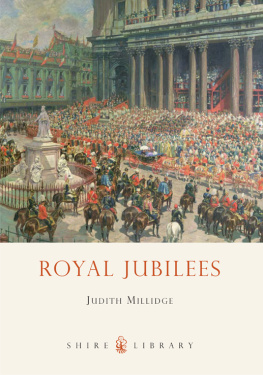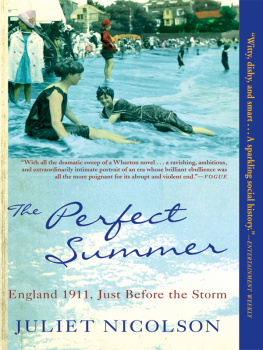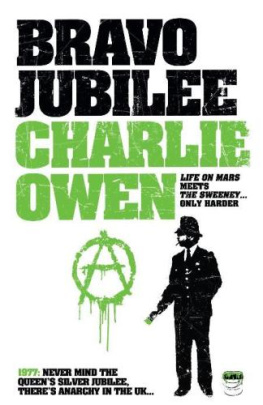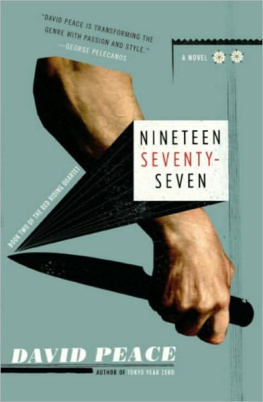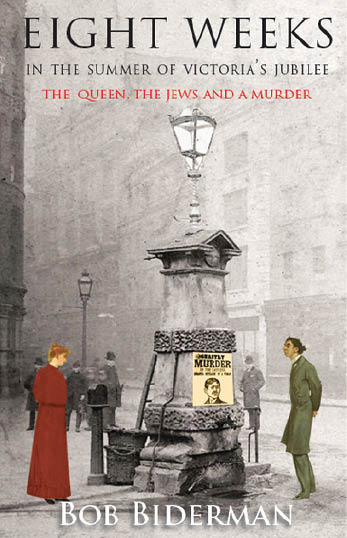First published in Great Britain
Black Apollo Press 2012
Germinal Productions, Ltd
Copyright Bob Biderman 2012
A CIP catalogue record of this book is available at the British Library. All rights reserved; no part of this publication may be reproduced or transmitted by any means electronic, mechanical, photocopying or otherwise without the prior permission of the publisher.
eISBN: 9781906448264
Paperback ISBN: 9781900355711
For information about our other titles, please go to our website:
www.blackapollopress.com
CONTENTS
Introduction | |
The Crime | |
Part 1: Weeks 1-4, The Inquiry | |
Part II: Week 5, The Trial | |
Part III: Weeks 6-8, The Aftermath | |
Epilogue | |
Endnote | |
Bibliography | |
Introduction
THE BIG RED double-decker tram clattered down Whitechapel Road, shooting sparks from its iron wheels as they grated noisily along tracks of rusty steel. Two lovers rode atop, gazing down at the bright and colourful regalia lining the boulevard, great and garish posters and signs in English and Yiddish celebrating the Queens Jubilee. They looked but didnt speak. It was a lovely Sunday afternoon. The world was bright. But in the distance beckoned the unknown.
It was the year before Eric Alfred Leslie Satie composed his maddening brilliant piano composition, Gymnopedies. That is to say it was a year before he put it to paper as it was still in his head along with blazing images of undulating whiteness. In fact, it would be correct to say that as these two young people clattered along in their blood-red tram, the future Gymnopedies was in a period of advanced gestation. But they knew nothing of Gymnopedies and it knew nothing of them. And therein resides the first in a series of strangely disconnected ironies.
Those Gallic gusts which blew northward across the channel, however, were of limited duration, reaching the ears of only a few and fewer still on Whitechapel Road that summer afternoon. Sometime later, when the woman from the tram met Eleanor Marx, who had just returned from France bringing sour loaves from the Baker of the Third Republic, she might have touched the sentiment which gave rise to the musical impressionists who were starting to paint the ossicles of a generation with tonal colours never before heard, though its far more likely that from her East End room it would have been the sounds of a Klezmer band recently arrived from Warsaw that assaulted her.
The young woman well call her Maggie and her beau well call him John, because thats what she called him werent ordinary lovers. Not that any lovers are ordinary, but these two were much less ordinary than most. This seemingly subjective observation was actually an objective fact and was true for the simple reason that John did not exist at least not in the eyes of the world at large that year in the summer of the Queens Jubilee. (This was also the year that a man named Jean Charcot at the Salptrire hospital in Paris began to wonder about one of his students who had recently returned to Vienna with a trunk full of notes which, unbeknownst to Charcot, would provide the basis for a seismic shift in thought behind the construction of the mental universe, giving new and profound meaning to the term alter ego).
For Maggie was John and John was Maggie. And love him she did as one can only love a cerebral creation. He travelled with her wherever she went and was, in the main, her obedient servant. But there were times ah, yes, there were times when John was not as obedient as Maggie might have desired. Yet isnt this true of all lovers?
However, that summers day on the big red tram trundling down Whitechapel Road toward the great waste at Victoria Park, John was being the solicitous gentleman a role which Maggie had taught him to perfection. And being a solicitous gentleman that day, he lent her his masculine eyes to observe but it was her feminine hand which wrote the details of these observations into the moleskin notebook he had once given her along with a box of coloured pencils (though doing so had set them both back nearly a shilling which meant that evening they had only bread and mouldy cheese for dinner).
At the same time Maggie and John were headed for Victoria Park another character, named Z, was making his way to the great market off Wentworth Street which was known as Petticoat Lane. Z was, at that time, in his middle twenties and though it was some years since he had left his East End home to move not so many miles in physical distance (light years in mental ones) to the northwest of London, still he found his way to the market quite often of late. Something drew him back there several things, actually. First there was money, or at least the promise of money. And second there was something else rather vague. It had to do with that duality all of us contend with at one time or another like the duality of Maggie and John but, in this case, also quite different. Zs duality had more to do with the simultaneous attraction and repulsion of something you long to escape and then find that youre attracted back because the very things youve tried escaping are the very things you feel youve lost which causes a strange sense of emptiness. Its one of those spiritual paradoxes that make life rather entertaining and unpredictable. And Z, being an individual with a finely developed sense of ironic humour, appreciated everything paradoxical as long as it didnt injure anyone (especially those he came to call his People).
Z, that day, was wearing a wrinkled shirt and an ancient cravat. He was also wearing a very dusty fedora black which was showing extreme signs of wear from being carelessly tossed onto chairs, tables, sofas and whatnot (but often ending up on the floor). And over his shoulders he wore a long, ill-fitting jacket also black that almost reached down to his knees and looked like something between a cape and an artists smock. (His future wife was to ask him about that jacket and the rest of his similarly ill-fitting clothes some years later, wondering aloud why he didnt change his tailor. And he would reply that his tailor was a kind and honest schlemiel who had come over from Russia, was poor as a church-mouse, had a wife and children to support and it would kill him if Z took his business elsewhere. Fortunately for Z, his future wife understood and told him that, of course, he should never take business away from that dear, sweet man which was also fortunate for the tailor.) Shabbiness was not out of place in the Petticoat Lane market for that was its very essence. Yet beyond the shabbiness, if one could get that far, was something remarkable. Beyond the dirt, beyond the grime, beyond the sputum, beyond the rank smells of unwashed bodies and rotting flesh, there was another world that Z found, to his great surprise, was far more fascinating than the one he had received in exchange for having taken several outstanding scholastic prizes thanks to a razor-sharp, parrot-like memory that had been honed to perfection as a child by his maternal grandmother.
Thus Z saw this amazing market with very different eyes than did Maggie. For Maggie, Petticoat Lane was dark, dingy and unpleasant a dank and dirty place where foreign people with ghostly faces and bony arms and hands with sores that never seemed to heal would fix you in their terrifying gaze (trying to sell you something you never really wanted) sending a diabolical chill down her back that caused a twitch in her Achilles tendon.

